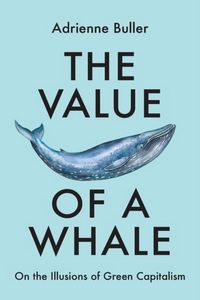Book Reviews: Bright Green Lies / Capitalism / Value of a Whale
Green Lies
 Bright Green Lies. How the Environmental Movement Lost Its Way and What We Can Do About It. Derrick Jensen, Lierre Keith and Max Wilbert. Monkfish Publishing, 473pp.
Bright Green Lies. How the Environmental Movement Lost Its Way and What We Can Do About It. Derrick Jensen, Lierre Keith and Max Wilbert. Monkfish Publishing, 473pp.
‘Instead of a movement to save the planet, we have a movement to continue its destruction.’
The quotation above sums up the theme of this book which casts its glance, both politically and ecologically, way back into the past as well as projecting fascinatingly into the future. It’s definitely a must-read, a powerful, eloquent and thought-provoking indictment of industrial capitalist society, in fact of all the hierarchical human societies that have developed over the last 10-12,000 years. In compelling terms it explains – and offers incontrovertible evidence of – how, since the advent of settled agriculture and the surplus production, oppressive hierarchies, urban settlement and militarism that came with it, the Earth has been massively and increasingly despoiled in the name of human exceptionalism. Now is the end game, insist the authors, unless, that is, immediate and widespread consciousness of what humanity is doing in the name of economic growth takes over and leads to action. Yet this is something, so the book’s title asserts, that forms no part of the current ‘green’ agenda, which is seen as no less harmful than fossil fuel use in continuing to extract from the environment resources that it cannot afford to lose and in destroying in the process the earth’s geological fabric and its non-human living creatures and organisms.
The authors bring to bear a mass of sobering evidence to show that even the most proclaimed ‘bright green’ policies and actions can never be more than a sop to the growth mantra of industrialised capitalism which can see the Earth only as a target for commodification – for producing goods for sale on the market. They go about systematically – and in many cases scathingly – dismantling the arguments put forward to remedy this by ‘deep green’ gurus such as Naomi Klein, Lester Brown and Mark Jacobson (the latter described as ‘someone working hard to kill the planet in order to save it’). And, in the process, they exhibit a breathtaking knowledge, both wide-ranging and detailed, of why all the many attempts at apparently environment-friendly activities amount to anything but and can only serve to add further to both climate change and the destruction of the environment. None of the ‘green’ policies widely presented as beneficial escape forensic – and damning – analysis under their gaze. So their book, in its various sections, takes apart and condemns as ‘lies’ the proclaimed virtues of, among other green ‘solutions’, solar panels, wind turbines, green energy storage, recycling, LED lights, electric cars, hydropower, biomass (described as ‘cutting down and burning forests’), and geothermal energy.
In all these cases, their fundamental argument, backed by abundant evidence and analysis, is that the complex infrastructure needed to set up, deal with and maintain all these ‘renewable’ activities and technologies actually relies on fossil fuels involving at least as much savage exploitation of the Earth‘s fragile resources, both biological and geological, as that involved in ‘non-green’ methods of production. In other words these ‘green’ technologies will carry on with what they term the ‘orgy of planetary destruction’. They will continue to rip the Earth apart to procure materials for their projects, will continue to hack to oblivion the planet’s natural structures formed over millions of years, and will continue to blow up mountains, turn forests into mines and poison water, air, soil, wildlife and the human population. These are all, in the authors’ words, ‘assaults against the living world’ causing ‘industrial-scale devastation’, and all claims for saving the environment by their use are dismissed as ‘green veneer’, as ‘cherry-picking’ of the facts and the available evidence.
The point, they argue, is that, much as the ‘bright greens’ may be genuinely concerned for the environment, the reality of what they propose and may do can never amount to more than ‘greenwashing’, given that the current system of industrial production cannot by its nature do other than subordinate real care for the Earth and its flora and fauna to the imperatives of growth and production for profit. It prioritises ‘fuelling the economy over saving the real world’. Attempts to suggest otherwise are, the authors insist, ‘green fantasies’, no more nor less than delusions providing comfort at the expense of reality. All this is summed up in their dictum ‘Our way of life doesn’t need to be saved. The planet needs to be saved from our way of life.’
So are we going to hell in a handcart no matter what? Well, sort of, according to this book, except that there is a chapter toward the end entitled ‘Real Solutions’, in which the authors do suggest how we might reverse or at least mitigate part of the increasing mess they have so painstakingly and passionately detailed and evidenced. The trouble is that this is the least satisfactory and least convincing part of the book. That’s because what they mainly have to offer are appeals to individuals or groups to get together in forms of environmental action (‘find something you love and defend it. A stream, a stand of trees, a struggling songbird’), or a call for ‘massive movements… using every tactic: political pressure, legal challenge, economic boycotts, civil disobedience and whatever else becomes necessary’, or, above all, appeals to governments to adopt various policies that will curb both industrial growth and population growth (eg, ‘governments need to stop subsidizing environmentally and socially destructive activities’). This after apparently recognising that governments are an integral part of the problem in their role of managing and supporting the growth/market system that leads to the very problems they abhor and so will not and cannot ‘act against the profit motive’. Or perhaps, despite such words, they somehow don’t take it fully on board and think it can somehow be different, perhaps in the same way as the ‘bright greens’ they criticise don’t want to believe that the profit system will brook no alternative to economic growth and unbridled exploitation of the Earth’s environment. Perhaps, in fact, at bottom Jensen, Keith and Wilbert do think, or at least hope, that governments can somehow be neutral and possess the power to regulate to their heart’s content the system of production for profit and buying and selling.
The reality is that capitalism with its commodification of everything has, as this book so trenchantly informs us, seriously damaged and may well be on the way to completely destroying the natural environment. But the way to prevent this going any further and reversing it as necessary is not via tweaks to the way we live and work today but by a democratic political movement expressing a majority will of the world’s people to collectively organise a leaderless, stateless society which will recognise the necessity to produce and distribute sustainably while being sensitive not just to the needs of the human species but to the whole environment of which we are a part, including its geology and its flora and fauna.
HKM
 Capitalism. The Story Behind the Word. By Michael Sonenscher. Princeton University Press. 2022.
Capitalism. The Story Behind the Word. By Michael Sonenscher. Princeton University Press. 2022.
This short book – the author calls it an essay – in the field of political and moral philosophy explains that the words ‘capitalist’ and ‘capitalism’ originated in France.
Capitaliste was the name given in the 18th century to those with money – capital – who lent it to the government to pay for its wars. Capitalisme was the name given to this as a system and ideology by royalist opponents of the French Revolution in the early 19th century who didn’t like the power and influence of these financiers. It was later taken up by those on the left such as the reformist Louis Blanc (the person credited with first saying ‘from each according to their abilities, to each according to their needs’). Sonenscher quotes him as saying that capitalism was the enemy of capital and advocating the state ownership of capital, a form of state capitalism that would have abolished ‘capitalistes’ and that had a future before it.
Sonenscher remarks that the word ‘capitalism’ does not appear in Marx’s Capital. This is true. Marx uses the term ‘capitalist mode of production’ by which he meant the system where capital was invested in production and which had quite different results than when it was lent to governments and whose abolition would end not only the social role of capitalist but also the whole system of investing money in production for sale on a market with the aim of making a profit.
Sonenscher traces how, in the discussions about the state, economy and society in the late 18th and early 19th centuries amongst some well known (Adam Smith, Ricardo, Hegel) and some less known writers of the period, ‘capitalism’ was contrasted to ‘commercial society’ resulting from the division of labour. Since then, he notes, the two terms have become conflated, with capitalism virtually coming to mean commercial society. This in fact comes nearer to what socialists understand by the word: a property society where everything, including people’s working energies, is subject to being bought and sold. However, in much popular usage, even by ‘anti-capitalists,’ the word still retains its original association with finance and banking.
Towards the end of the book the author reveals that he doesn’t think that either commercial society or lending to governments can be ended. He sees what exists – where the state borrows money to mitigate the worst effects of commercial society – as all that is possible. Despite this, his essay is an interesting discussion of the origin and history of a key word in the socialist vocabulary.
ALB
The Time of a Whale
 The Value of a Whale: On the Illusions of Green Capitalism. Adrienne Buller. Manchester University Press £12.99.
The Value of a Whale: On the Illusions of Green Capitalism. Adrienne Buller. Manchester University Press £12.99.
Green capitalism is described here as involving two main aspects: the wish to maintain existing capitalist relations, and the attempt at the same time to expand accumulation during the transition to an ecologically sustainable method of production. It is, Buller argues, self-defeating, as profit-motivated ‘solutions’ just exacerbate current inequalities. Economic imperatives are given priority over other needs, and even the Green New Deal still refers to markets and profits. Appearing to act on the climate crisis is widely seen as important, but effective action is much rarer.
One crucial area for addressing climate change is decarbonisation, which involves reducing the amount of carbon released into the atmosphere. Green capitalism addresses this either by imposing a carbon tax (depending on the cost per unit of carbon emitted) or by invoking a carbon market (whereby a firm has a cap on how much carbon it can emit and can ‘trade’ with others for additional amounts they will not use). But cost and profits are in general big obstacles to decarbonisation, and the fossil fuel industry has successfully lobbied against carbon taxes in almost all cases where they have been proposed. Carbon markets often involve companies in wealthy countries balancing their emissions against those in less developed parts of the world. Carbon offsetting, such as newly-planted trees, is unregulated and barely effective.
A fair amount of attention is given to what has been termed ‘asset manager capitalism’, whereby firms such as BlackRock and Vanguard play a large role in the corporate economy. This has become increasingly the case since the 2007–8 financial crisis, and they provide at least as much credit to companies as banks do. Asset management funds often adopt the strategy of passive investing, which means they buy many of the securities tracked by a share index in order to replicate its performance. They rarely disinvest in a company, and emphasise long-term investment. They have little interest in influencing corporate behaviour regarding the climate, and BlackRock in particular operates a revolving door with government, in both the US and UK.
The author says her aim is not to suggest solutions to the ecological crisis, but rather to argue that green capitalist approaches do not offer a path to a safe future. With reference to carbon sinks, which absorb more carbon than they emit, she writes refreshingly that ‘We are more than capable of sustaining a decent life for all – and for the long term – with the space, resources and natural “sinks” this planet generously offers.’
In case you are wondering, an IMF study estimates the value of a great whale at $2m, based on their contribution to eco-tourism and their capacity for carbon capture.
PB
